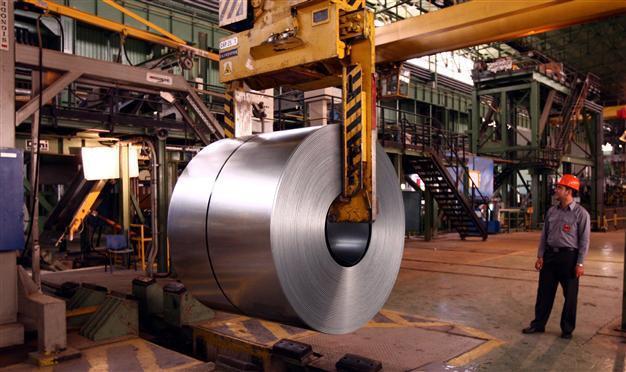Iran’s steel buyers hit by Western sanctions, look at Turkish exports
LONDON

A picture made available in June shows a general view of the steel production line at the Mobarakeh steel company in the city of Isfahan, central Iran. The country is today facing a steel shortage. EPA photo
Iranian manufacturers and builders face serious shortages of steel and other metals as a new European Union export ban adds to the troubles of an economy already reeling from sanctions on its finances and oil exports, Reuters reported yesterday. However, Turkey remains a strong supplier, sources have said. Turkey’s rising steel exports to the Middle East, traditionally not its top market, may also be signaling such a situation.
Data show Iran’s purchases of foreign steel are already falling as buyers are being hit by EU and U.S. measures which hinder banks, insurers and others supporting trade with Tehran. Some Iranian steel buyers have resorted to barter deals. Explicit sanctions imposed by the European Union on Oct. 15 on sales of steel, aluminum and other key materials have prompted some traders to halt all sales and Iranian businesses now face rising prices and scarce supply. “The ban on metals like aluminum and steel recently imposed by the EU has a sort of ‘multiplier’ effect of pushing the Tehran regime into a new cycle of activities to dodge the effects of the sanctions, a course which will end up creating new complications and pushing up costs,” Reuters quoted J. Peter Pham, a director at U.S. think-tank Atlantic Council, as saying.
Iran has imported up to 10 million tons of steel annually in recent years, but data from the International Steel Statistics Bureau (ISSB) suggest a declining trend even before the EU ban. Imports were about 4 million tons in the first nine months of 2012, almost a quarter down from the same period last year. “Sanctions have completely crippled all civil projects. Now even the strongest contractors have stopped work,” Farid, 49, who runs a major Tehran building firm, told Reuters by email. Another Tehran executive, a 42-year-old engineer, said his company had put off building a factory due to problems obtaining key materials from Europe and the poorer quality of Chinese and local substitutes.
Exports via Turkey China has increased steel exports to Iran slightly but volumes from other big suppliers South Korea and Russia have declined since the beginning of the year.
One trading source involved in cargo around the Black Sea said shipments of steel to Iran from Western Europe had slowed considerably but supplies were arriving in from elsewhere, via Turkey and across the Caspian Sea. “Turkey looks increasingly like the major gateway these days,” he said. “The Caspian Sea area has also provided exports – but bear in mind with colder weather the rivers will freeze up, so that route will not yield much for now.”
Turkey exported steel worth $13.1 billion in the first 10 months of the year, which is up 11.09 percent from the same period in 2011. Some 6.9 million tons of a total of 16.7 million tons of production went to the Middle East, the Turkish Steel Exporters’ Association (ÇİB) said in a report earlier this month, without elaborating on the purchases by each nation.
Builders across Iran are suspending construction projects and channeling any spare funds into land purchases or safe-haven assets like gold. Iran’s gold purchases from Turkey have been rising enormously, increasing all through the year. Turkish gold exports to the United Arab Emirates jumped in August and September, with multiple media reports claiming that large amounts of these exports then head to Iran, which is trying to defend its rial against the greenback in an inflationist environment.
Iran’s coal trade is also booming as the Islamic Republic tries to increase its domestic steel production, media reports have said.
Iranian economy contracts
Economic performance in Iran has shown a small contraction because of a Western ban on oil exports whose impact is spilling over into other sectors, the International Monetary Fund said yesterday.
“The projection that we have shows small contraction in Iran economy during 2012 ... and an increase in inflationary pressure in the same period,” the IMF’s head of Middle East and Central Asia, Masood Ahmed, told AFP in Dubai where he presented the Fund’s Regional Economic Outlook report.
IMF figures released last month forecast an economic contraction in Iran of 0.9 percent this year, and mild growth of 0.8 percent in 2013.
The figures compare to 2.0-percent growth in 2011 and 5.9 percent in 2010.
“This deterioration reflects both lower oil production, which is in part because of the external constraints and the spillover impact of that on the rest of the economy,” he said.
DUBAI Agence Fraence-Presse
